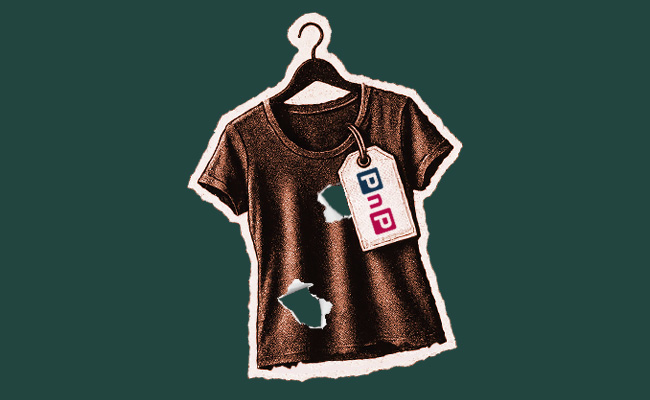Google “behavioural economics” and “money trauma” and suddenly you realise that you’re far from alone in trying to understand your own (bad/chaotic/irrational) economic decisions.
Behavioural economics, after all, is the psychology behind the economic decision-making processes of individuals and institutions. Harvard Business School professor Gerald Zaltman famously argued that 95% of our purchase decisions “take place unconsciously”.
Why, after all, don’t you switch bank accounts if you know there’s a cheaper alternative? As for money trauma, there are legions of sites and blogs to try and deal with the emotional fallout of past financial decisions – be they yours or your family’s.
There’s a huge body of scholastic work out there; some of it cited by the Canadian Centre for Policy Alternatives, which authored a chunky study on financial trauma in 2022 – the question being: how does trauma affect financial behaviour? Does it lead people to make more or less beneficial decisions? (The conclusion, in a nutshell: it’s complex and there are no obvious answers.)
Classic signs of money trauma include flagrant spending, which only worsens your financial difficulties, chronic underspending, and constant obsessing over money (though the latter preoccupation sounds like a universal truth, to be fair). Then there’s the dogged avoidance of your own financial matters – like ignoring your taxes, which may stem from a sense of powerlessness in the face of financial challenges.
So prevalent are conversations around money trauma that Momentum Group recently put out a helpful note on the subject. Chief marketing officer Nontokozo Madonsela says our money trauma has the power to unravel lives and paralyse us when it comes to money decisions.
Managing your emotions
“We talk about managing your money successfully, and we asked ourselves: ‘What comes in the way? Why do people have an emotional reaction to money? Whether you have a lot of it or a little of it, or none of it.’ When we started exploring why people are fearful or anxious or irresponsible, we realised that these behaviours are often influenced by one’s previous experiences.”
Sure, that’s stating the obvious, but everyone has their own story.
Mine, for example, is watching my mother pay for groceries with cheques because, as the family of an entrepreneur, cash flow was tight, and sometimes non-existent. It helps explain why I have a morbid fear of an empty bank account and would prefer to see my money sitting there than doing good things compounding in an investment portfolio, say.
In Madonsela’s case, her trigger is being born in January, a month when money was always tight, which meant that birthdays felt like an afterthought. Gifts were mostly necessities, like a new school uniform or a pair of Bata Toughees, rather than items she truly desired.
These moments, though seemingly small, she says, leave lasting imprints on one’s personal relationship with money.
As for the very real trauma of growing up poor, “stress isn’t just an occasional burden, it runs deep, shaping the way [people] think, feel, and make financial decisions long into adulthood”, she says.
“Growing up experiencing persistent financial hardships can create a cycle of adversity that perpetuates the trauma across generations. Limited access to resources, education and a stable job make it challenging to escape financial distress.”
Given that one’s “trauma” is so subjective, what sort of common rules can we apply to sidestep any self-sabotage?
Identify and challenge your triggers
“Recognising what triggers your financial stress is the first step,” says Momentum, whether it’s the anxiety you feel when checking your bank balance or the guilt of spending on yourself.
“Ask yourself: Is this fear based on past experiences rather than my current reality? Am I holding onto money beliefs that no longer serve me?”
Ask for the right help
Your emotional and social wellbeing depends on the state of your mental health; if you can, seek counsel from either a psychologist or a financial adviser. Hopefully, the latter isn’t in fact the cause of your financial stress; ideally, they should help you understand what is involved in meeting your future goals, says Momentum, and help get you there.
Asked about the very real possibility of bad advice, Madonsela says that would be unfortunate. “But professional financial advisers have a code they have to operate under. Sometimes they’ll tell me things I don’t want to hear – like whether I’m overprotected in one sphere and underprovisioned in another. Even if you’ve had a bad medical experience, it doesn’t mean you should stop looking after your health, for example.”
Set budget boundaries
“Start seeing financial boundaries not as restrictions but rather as empowerment,” says Madonsela. “Setting clear limits on spending and defining your financial priorities can help you regain control and prevent unnecessary stress.”
Begin by reflecting on past financial decisions, she urges. “Identifying patterns allows you to put safeguards in place, whether that’s setting a spending cap on non-essentials, avoiding impulse purchases, or having an accountability partner.”
Ultimately, recognising financial trauma in your own life is an important part of taking control. Says Madonsela: “In this way, you can take steps to recover and start building the life you want for yourself.”
Sign up to Currency’s weekly newsletters to receive your own bulletin of weekday news and weekend treats. Register here.














